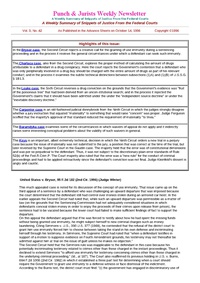The Court did, however, back off slightly by stating that the Supreme Court has made clear that "for such a claim to ever be successful, the defendant's burden of proof would 'necessarily be extraordinarily high'." (Id., at 957).
This case is noted for the astonishing statement that "it …
The Court held that the proper test is whether the jury was so impressed with the judge's partiality to the prosecution trhat it became a factor in determining the defendant's guilt or whether "it appear[ed] clear to the jury that the court believe[d] the accused is guilty", citing U.S. …
Here the Court vacated a restitution order imposed before the adoption of the Mandatory Victims Restitution Act, holding that the district court erred in concluding that restitution was required in all cases.
One of the issues raised on this appeal was the validity of a restitution order that …
Court vacated perjury conviction because the jury did not determine the materiality of the alleged false declaration.
This drug sentencing case focuses on the subtle distinctions between subsections (1)(A) and (1)(B) of U.S.S.G. § 1B1.3 (relevant conduct). Under subsection (1)(A) a defendant is accountable for all quantities of drugs "with which he was directly involved" without regard to whether he knew or could reasonably foresee the …
This is another one of those "Zap the Rat" cases which shows both the seductive, but deceptive, traps for the unwary that are set out by the Government to induce defendants to provide substantial assistance and the semantic parodies engaged in by the courts to justify the seduction. Here, …
The cornerstone of Carriger's claim in this case was the testimony of one Robert Dunbar in a 1987 state post-conviction proceedings. Dunbar was the principal witness against Carriger at his 1978 trial for the murder of Robert Shaw. In exchange for his testimony, the State gave Dunbar immunity for …
While the dissent labels this case "hypertechnical", its significance can best be measured by the weeping and wailing contained in Judge Kleinfeld's splenetic dissent. He rails that two recent Supreme Court cases (Bailey v. U.S., 133 L.Ed.2d 472 (1995) and U.S. v. Gaudin, 132 L.Ed.2d 444 (1995)) have already …
The Court observed: "A defendant may waive a statutory right to appeal his sentence. United States v. Navarro-Botello, 912 F.2d 318, 321 (9th Cir. 1990), cert. denied, 503 U.S. 942 (1992). However, an express waiver of the right to appeal is valid only if knowingly and voluntarily made. [U.S. …
Citing New York v. U.S., 505 U.S. 144 (1992), the Court also held that if Congress acts under one of its enumerated powers - here its power under the Commerce Clause - there can be no violation of the Tenth Amendment.
[Editor's Note: In 1992, Congress enacted 18 U.S.C. …
